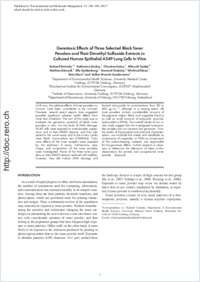Genotoxic effects of three selected black toner powders and their dimethyl sulfoxide extracts in cultured human epithelial A549 lung cells in vitro
- Gminski, Richard Department of Environmental Health Sciences, University Medical Center Freiburg, Germany
- Decker, Katharina Department of Environmental Health Sciences, University Medical Center Freiburg, Germany
- Heinz, Christina Department of Environmental Health Sciences, University Medical Center Freiburg, Germany
- Seidel, Albrecht Biochemical Institute for Environmental Carcinogens, Groβhansdorf, Germany
- Könczöl, Mathias Department of Environmental Health Sciences, University Medical Center Freiburg, Germany
- Goldenberg, Ella Institute of Geoscience, University Freiburg, D-79104 Freiburg, Germany
- Grobéty, Bernard Department of Geosciences, University of Fribourg, CH-1700 Fribourg, Switzerland
- Ebner, Winfried Department of Environmental Health Sciences, University Medical Center Freiburg, Germany
- Gieré, Reto Institute of Geoscience, University Freiburg, D-79104 Freiburg, Germany
- Mersch-Sundermann, Volker Department of Environmental Health Sciences, University Medical Center Freiburg, Germany
-
06.04.2011
Published in:
- Environmental and Molecular Mutagenesis. - 2011, vol. 52, p. 296–309
English
Until now, the adverse effects of toner powders on humans have been considered to be minimal. However, several recent reports have suggested possible significant adverse health effects from toner dust inhalation. The aim of this study was to evaluate the genotoxic potential of black toner powders in vitro. For the study of DNA damage, A549 cells were exposed to toner-powder suspensions and to their DMSO extracts, and then subjected to the comet assay and to the in-vitro cytokinesis block micronucleus test (CB-MNvit). Cytotoxic effects of the toner samples were assessed by the erythrosin B assay. Furthermore, size, shape, and composition of the toner powders were investigated. None of the three toner powders or their DMSO extracts reduced cell viability; however, they did induce DNA damage and formed micronuclei at concentrations from 80 to 400 μg cm⁻², although to a varying extent. All toner powders contain considerable amounts of the pigments carbon black and magnetite (Fe₃O₄) as well as small amounts of polycyclic aromatic hydrocarbons (PAHs). The overall results of our in-vitro study suggest that the investigated toner-powder samples are not cytotoxic but genotoxic. From the results of the physical and chemical characterization, we conclude that metals and metalloids as components of magnetite, or PAHs as components of the carbon-bearing material, are responsible for the genotoxic effects. Further research is necessary to determine the relevance of these in-vitro observations for private and occupational toner powder exposure.
- Faculty
- Faculté des sciences et de médecine
- Department
- Département de Géosciences
- Language
-
- English
- Classification
- Biological sciences
- License
-
License undefined
- Identifiers
-
- RERO DOC 22511
- DOI 10.1002/em.20621
- Persistent URL
- https://folia.unifr.ch/unifr/documents/301789
Statistics
Document views: 116
File downloads:
- pdf: 560
